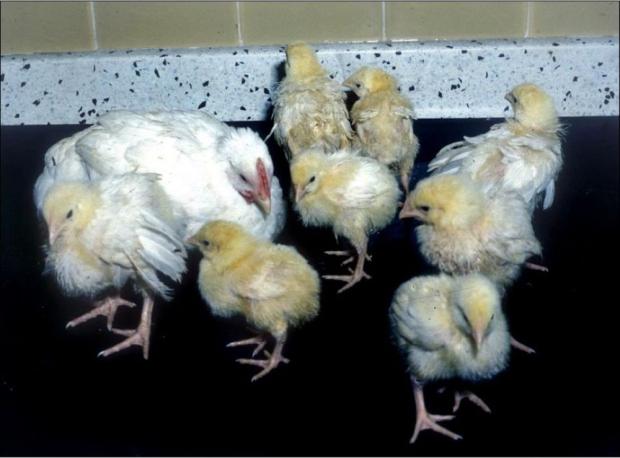Poultry virus research at AFBI Stormont
Virology Branch, based at AFBI Stormont, has a long history of avian virus research with an international reputation for pioneering studies in viruses such as fowl adenoviruses, avian astroviruses and chicken anaemia virus. Its research is primarily aimed at discovering the role of viruses in poultry disease and in improving the diagnosis and control of virus infections in chickens.
Viral disease of the chicken gastrointestinal tract
Chicks are particularly susceptible to bacterial and viral infections in the first 10-14 days of life (the brooding period) when they are developing their adaptive immune, digestive and thermoregulatory systems and adverse effects, especially on growth rates, can last throughout the rearing period until slaughter at approximately six weeks for meat birds.

A related, chronic condition, also endemic to intensively farmed broiler flocks globally, is uneven flock growth (UFG), which may result in poorer FCR (feed conversion ratio), poorer bird health and processing issues with undersized birds at slaughter.
Research and diagnostic studies of poultry enteric viruses
Different viruses including astroviruses, reoviruses, parvoviruses and many others have been associated with RSS/UFG in chickens and are often detected as co-infections of two or more of these viruses. These are generally chicken-specific viruses that are not known to cause illness in people.
Molecular Virology
Cutting-edge molecular virology studies at AFBI have demonstrated the presence of multiple viruses in the period soon after hatch, which can be considered as communities of viruses that are known as the “virome”. Many of these viruses are small, round viruses with RNA genomes prone to rapid evolution resulting in multiple circulating strains.
Vaccine control
There are few vaccines available to control individual GIT viruses and none that are fully effective against RSS or UFG therefore control measures are largely by biosecurity, careful management and hygiene.
The main poultry research by AFBI Virology Branch is in determining the range of viruses that comprise these communities and in finding solutions to the growth problems by means of vaccines or other methods such as anti-viral feed additives.
Other research
Other research includes investigating the role of avian astroviruses in hatchery disease and kidney disease of broilers and in determining which strains of reovirus are involved in growth problems of broilers and lameness in breeders, in order to develop effective control measures and improve poultry health.